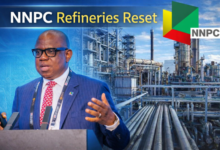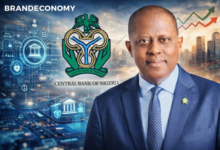NIGERIA’S POWER FAILURE: THE SHAME OF A NATION BRAND
There are many things wrong with Nigeria but perhaps the most frustrating and perplexing is the unending cycle of abysmal electricity supply which has, for decades, been served as staple by virtually all administrations in the country’s history. For the hapless Nigerian citizens the power-supply (or non-supply) debacle is the biggest scandal of our generation.
Matters have only gone from bad to worse since the return to civil rule in 1999. Even as various governments have claimed to have allocated huge budgets to the power sector, Nigerians daily groan under the pain of darkness and the huge costs in arranging for alternative power supply. There have been allegations that Nigeria’s power problems are complex due to high-level corruption and the failure of successive governments to put people with the requisite knowledge and capacity to lead the much-desired revolution in that sector. A Nigerian with the avowed endowments, Professor Barth Nnaji was unceremoniously relieved of his appointment as minister when the hawks in government and their cohort felt threatened that his policy initiatives and handling of the privatization programme would not be to their benefit.

The current situation is very dire as there have been at least 3 confirmed total systems collapse in 2019 alone. A systems collapse means zero power electricity was transmitted through the national grid to all parts of Nigeria. Electric power generation in Nigeria began in 1896 when two small generating sets were installed to serve the then Colony of Lagos and by 1929, the Nigeria Electric Supply Company, NESCO, was established. It was succeeded by Electric Corporation of Nigeria, ECN, in 1951. Eleven years later, the Nigeria Dams Authority, NDA was created for the main purpose of developing hydropower potentials in Nigeria and by 1972, ECA merged with NDA to form the National Electric Power Authority, NEPA. NEPA later metamorphosed into Power Holding Company, PHCN.
The Nigerian electricity industry consists of gas production & supply, electricity generation, electricity transmission and electricity distribution. According to the Nigerian National Petroleum Corporation (NNPC), as at 2018, Nigeria’s proven gas reserve went up to 202 trillion cubic feet (TCF). This allowed Nigeria maintain its spot as 9th in the world and 1st in Africa with the largest natural gas reserve.
The Nigerian gas, apart from its export potential, has local demand responsibilities towards the cement industry, iron and steel plants and of course, the country’s power generation, which is the largest consumer with about 70% used to operate electricity.
With this estimation, generating power should not be a problem for Africa’s giant but then, inadequate policies and leadership failure has frustrated every government since 1999 to up the ante in electricity production and supply. Presently, Nigeria has over 12500MW Electricity Generating Plants installed in the country but the absence of necessary available gas network to these plants render most of them useless.
According to reports, Vice president Yemi Osibajo in October 2017 said Nigeria’s power generation capacity was above 7,000MW. But there is a huge difference between capacity and actual output. Clearly, if he meant the installed generation capacity (the amount of power that could be generated if a plant ran at maximum capacity) or the actual power generated. He was, however sincere enough to state that “challenges persist with distribution to consumers.”
After generation, the second phase of the electricity value-chain is transmission. Having been in use for decades, most of the nation’s transmission lines have long reached obsolescence and need to be replaced with more recent and rugged cables. Most are incapable of carrying high-capacity electric load but they remain in use, leading to frequent transmission collapse.
The Generating Companies (GenCos) supply the sub-stations of the Distribution Companies (DisCos) electricity via the Transmission Company of Nigeria, (TCN). DisCos then step it down and distribute to the end-users at homes, offices and factories. The TCN which is fully owned and managed by the Federal Government owns 40% of the GenCos and DisCos which were controversially privatized in 2013.
While the distributing arm of the sector bears the brunt of the angst from the people, the TCN is overlooked. According to Edmund Olotu, an energy consultant, the electricity industry suffers transmission losses of 16% of power generated to DisCos but, the DisCos suffer an additional loss of up to 12% within its distribution infrastructure. This means Nigeria receives only 72% (4300MW) of the electricity generated by the GenCos which has reportedly never exceeded 5000MW.
Though this fact is always denied when raised, everything in the power sector is ‘technically’ managed by the Federal government, including tariffs and the Nigerian Electricity Regulatory Commission, NERC.
In 2005, the Nigerian Electricity Regulatory Commission, NERC was formed under the Obasanjo administration’s economic reform agenda through the Electric Power Sector Reform Act. The commission was to be responsible for formation and review of electricity tariffs, transparent policies regarding subsidies, promotion of policies that are efficient and environmentally friendly, and also including forming and enforcing of standards in the creation and use of electricity in Nigeria.
But it would seem that this commission has not carried out its duties diligently. Its main focus, which is the interest and satisfaction of the consumers seem to have been compromised. It has unwittingly continued to condoned acts that are to be punishable by law.
A good example is the issue of electricity theft. The NERC in 2018 presented a bill to the Senate, seeking seven years jail term for electricity theft and the Senate passed the Bill in 2019, increasing the term by three more years. But most government agencies engage in illegal use of electricity and destruction of electric power infrastructure, yet, they have not been sanctioned. These agencies also either don’t pay bills or owe the distribution companies huge amounts of money. The consumers who don’t get the power are then forced to pay outrageous bills on the so called ‘estimated billing’ option.
The appalling state of power supply has crippled a lot of businesses and indeed made a lot of industries relocate to neighbouring countries, especially Ghana which got their acts right during the President Jerry Rawlings administration. Manufacturers bear losses on a daily basis because cost of production is steep. This does not bode well for competitiveness as Nigeria-manufactured goods are invariably more expensive to produce.
As stated earlier, every arm of the power sector is controlled by the federal government; the DisCos included. Most of the DisCos were sold to friends of the government at the time of sales with no pedigree, no technical capacity, no financial capacity and no long-term plans. The GenCos and DisCos borrowed money that are USD-denominated and have to pay back in the same currency. And with the devaluation of the Nigerian currency, this means they pay more than 100% of what they originally owed because they earn in Naira. Mr Ettu Mohammed, a columnist in Sahara Reporters in a recent article, analysed it thus: “you borrowed $1m in 2013 that is N155m without interest rate and you want to pay back in 2019 that is N360 million=$1m without interest rates. It means these companies are indebted to the tune of N205m extra because they will earn in Naira and pay in Dollar and your currency has been devalued.

What exactly were they thinking? We don’t have the financial capability to better the electricity industry. The cost of a thousand megawatt power plant exceeds $700million and it moves closer to $1billion when financing costs, installation, operations and maintenance are included. This equates to about $1Million (more than N350M) per megawatt of power. This is a huge cost that will certainly have to come in the form of foreign direct investment.
Equipment are import dependent and when the Nigerian currency was devalued in 2016, energy was sold at N30/kWh averagely 15.2¢ and thereafter, dropped to 8.3¢ today that is 45% loss in tariff. The list is endless and the only target here for this sector is income. Generating money to pay debts is the focus and the things to be done are overlooked.
There is a gaping failure in the electricity industry but everyone is busy playing the blame game. The electricity companies shift the blame around and nobody wants to take responsibility for the defects. DisCos complain they are losing lots of money due to meter bypassing by consumers, the TCN complains the GenCos are not bringing enough, and then the GenCos complain they give more than enough but the DisCos most times ration how much power they buy from them due to their limited funds. And the cycle goes on and on.
Clearly, there is an urgent need to fully decentralize the electricity industry in Nigeria. States, other tiers of government and renowned industries in the sector should be allowed to generate, transmit and distribute electricity in their respective locations. Captive power plants of states and other stakeholders should be allowed to first serve their immediate communities, while excess generation can be loaded to the national grid. We cannot keep doing the same thing and expect different results. The national assembly needs to treat the electricity conundrum as a national emergency as its early resolution will have positive spin-off effects in other key areas of development. The constitution needs to be amended to, among other things, remove electricity from the Exclusive List. Multiple electricity generation streams need to be adopted including green and renewable energy which is where the developed world has already made remarkable advances.
It is also about time for NERC to rise up to its responsibilities and start executing its mandate with the requisite professionalism and political will to take Nigerians out of the doldrums. In the meantime, the country needs a forward-thinking professional to over-see this all important overhaul of the industry, someone in the mold of Professor Barth Nnaji who has the relevant pedigree and knows ‘where the bodies are buried’. This shame-game must be stopped!
Yetunde Adegoke












